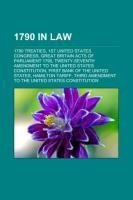
-
 Anglický jazyk
Anglický jazyk
1790 in law
Autor: Source: Wikipedia
Source: Wikipedia. Pages: 32. Chapters: 1790 treaties, 1st United States Congress, Great Britain Acts of Parliament 1790, Twenty-seventh Amendment to the United States Constitution, First Bank of the United States, Hamilton tariff, Third Amendment to the... Viac o knihe
Na objednávku
14.67 €
bežná cena: 16.30 €
O knihe
Source: Wikipedia. Pages: 32. Chapters: 1790 treaties, 1st United States Congress, Great Britain Acts of Parliament 1790, Twenty-seventh Amendment to the United States Constitution, First Bank of the United States, Hamilton tariff, Third Amendment to the United States Constitution, United States Bill of Rights, Nonintercourse Act, Residence Act, United States Senate elections, 1790, Nootka Convention, Copyright Act of 1790, 1790 United States Census, United States House of Representatives elections, 1789, Judiciary Act of 1789, Treaty of Reichenbach, United States House of Representatives elections, 1790, Naturalization Act of 1790, An act to regulate the time and manner of administering certain oaths, Treason Act 1790, United States Senate elections, 1788, Moors Sundry Act of 1790, Treaty of New York, Polish-Prussian alliance, List of United States Senators in the 1st Congress by seniority, Stage Coaches Act 1790, Treaty of Värälä. Excerpt: The Bill of Rights is the collective name for the first ten amendments to the United States Constitution. They were introduced by James Madison to the First United States Congress in 1789 as a series of legislative articles and came into effect as Constitutional Amendments on December 15, 1791, through the process of ratification by three-fourths of the States. The Bill of Rights is a series of limitations on the power of the United States federal government, protecting the natural rights of liberty and property including freedom of religion, freedom of speech, a free press, free assembly, and free association, as well as the right to keep and bear arms. In federal criminal cases, it requires indictment by a grand jury for any capital or "infamous crime", guarantees a speedy, public trial with an impartial jury composed of members of the state or judicial district in which the crime occurred, and prohibits double jeopardy. In addition, the Bill of Rights reserves for the people any rights not specifically mentioned in the Constitution and reserves all powers not specifically granted to the federal government to the people or the States. Most of these restrictions on the federal government were later applied to the states by a series of legal decisions applying the due process clause of the Fourteenth Amendment, which was ratified in 1868. The Bill was influenced by George Mason's 1776 Virginia Declaration of Rights, the 1689 English Bill of Rights, works of the Age of Enlightenment pertaining to natural rights, and earlier English political documents such as Magna Carta (1215). Delegates to the Philadelphia Convention on September 12, 1787 debated whether to include a Bill of Rights in the body of the U.S. Constitution, and an agreement to create the Bill of Rights helped to secure ratification of the Constitution itself. Ideological conflict between Federalists and anti-Federalists threatened the final ratification of the new national Constitution. Thus, the Bill a
- Vydavateľstvo: Books LLC, Reference Series
- Rok vydania: 2014
- Formát: Paperback
- Rozmer: 246 x 189 mm
- Jazyk: Anglický jazyk
- ISBN: 9781156357279





 Ruský jazyk
Ruský jazyk 






